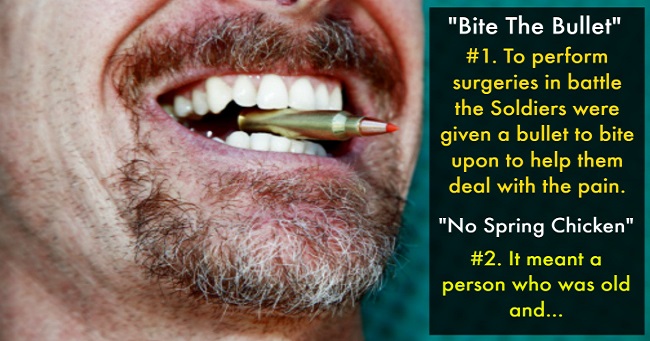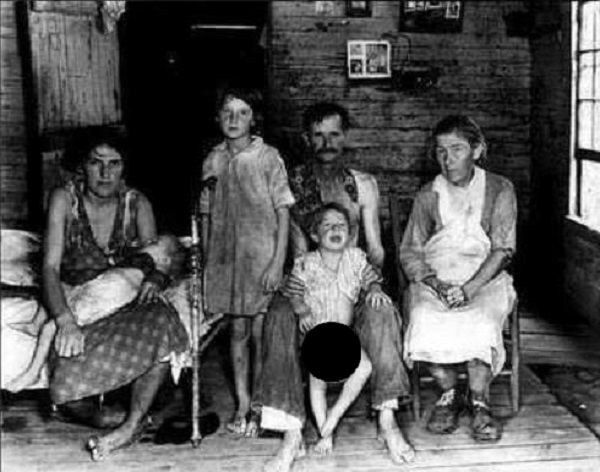


The English language is full of common metaphoric expressions among which some have their origins in America or England. Many of these were based on common incidents or practice whose descriptions ultimately paved the way for synonymous expressions. Here are the 15 origins of common expressions.
In early days, urine was widely used all over the world to tan the hides of animal skins as a preparation process for tanning so that the hair could be removed easily. Several families would ask all family members to pee in a pot which was then taken to tanneries and sold. This began to mean “piss poor”.
However, there is also the notion that this wasn’t the case regarding the expression Piss poor which actually came to be associated with the word poor and dates back to 1905 when people could ill afford the common pot required to be kept in bedrooms for the purpose of urination. Piss Poor also came to be associated with a poor job and similar to the saying “shit for brains”

Image Source: www.thisblewmymind.com
It means to accept a painful situation and has its possible origins during surgical procedures on wounds of soldiers at a time when anesthesia was scarce. A soldier was then given a bullet to bite upon to prevent him biting his tongue and dealing with the pain.
The phrase, in fact, was first recorded in a book by Rudyard Kipling titled “The light that failed” written in 1891. However the phrase “Chew a bullet” dates back to 1796 at a time when soldiers were required to bite off cartridges before inserting them into the barrel of a rifle.
Image Source: www.wisegeek.com
There is mixed opinion about the saying. One of which states that in earlier times, houses were made with thatched roofs where dogs and cats liked to hide. But when it rained, they would jump out hence the expression.
Another belief is that, cities suffered from sanitation issues including an increased number of stray cats and dogs. Heavy rains would result in the deaths of many cats and dogs that would be seen lying in gutters, thus it came to be known as cats and dogs.
Image Source: www.england.net
One theory states that the term originated in 1100 in the town of Great Dunmow in Essex, England. Legend has it that the local church would gift a side of bacon to a man who was honest enough to reveal that he had not fought with his wife for a year and 1 day. That man would also be considered a role model by society.
It also implies making a sudden amount of money at a time in the 20th century when people could ill afford meat and ate most potatoes and vegetables. Bringing home a slice of bacon was a luxury when someone made extra money.
Image Source: www.freestockphotos.biz
This has some eerie origins. In old England especially when in times of sickness and plagues, there was a shortage of graves so old ones were dug up and the bones taken to a bonehouse. When the coffins were open, they would find a number of scratch marks in the inside suggesting that the person wasn’t really dead.
Thereafter, people were buried with a string attached to their wrist which was strung through a small aperture in the coffin and attached to a bell on the surface. A person would be needed to sit out the whole night by the grave which led to the term “Graveyard Shift” Thus the person if alive was saved by the bell.
Image Source: www.iloveuselessknowledge.com
This means that family is the first priority. In Ancient cultures, blood began to represent a bond between men who were in most cases warriors that also led to the term “becoming blood brothers”. The warrior who fought alongside each other as blood brothers were regarded as more important than family.
In respect to the family theory, there is a document dating back to 13th century Germany called the Heidelberg manuscript which contains the sentence "I also hear it said, kin-blood is not spoiled by water."
Image Source: www.dailymail.co.uk
Among common expressions, everyone knows that this means making peace and that it originated in America where native Indians were always in conflict with Puritan settlers. When negotiating a peace treaty, they would bury their weapon and make them inaccessible.
The hatchet, of course, was the biggest symbols of war which were buried first including knives, tomahawks and bows and arrows.
Image Source: www.yewonline.com
To eat Humble pie has its origins in the 14th century when the entrails of animals called offal were made into pies. The term soon came to be known as umbles in the 15th century and the first reference to umble pie was observed from 1330 onwards. As a type of humiliation, it also came to be synonymous with the act of having to apologize after defeat.
Commoners who were invited to the feast of a lord or duke were served such umble pies to show them their social standing.
This was, of course, ignoring somebody intentionally. Today it is a rude gesture but in ancient England, it was, in fact, the opposite; It was considered a polite gesture to let a guest know that it was time to leave and event that he or she had been invited too. At this time they were served a cold portion of meat cut from the shoulder of an animal.
The expression itself is attributed to Sir Walter Scott when he used it in his novel the Antiquary written in 1816.
"Ye may mind that the Countess’s dislike did na gang farther at first than just shewing o’ the cauld shouther..”. where cauld meant cold and shouther meant shoulder
Image Source: www.pinimg.com
The phrase originated in the 17th century and means to relax but in today’s terms, it is more synymous with having a blast. Parisian nobles would also risk criticism and condemnation if they appeared in public without doing up their hair. Intricate and complex styles required women standing for hours on end with heavy ornaments woven into their hair. Thus at the end of the day, letting ones hair down provided extreme relief.
Image Source: www.picdn.net
It means owning more than you need and among common expressions, it applied to farmers who had more sheep than they could control so they would shake a stick at the sheep to herd them.
There is another opinion that too many to shake a stick at is an indication of fallen enemies. “Not worth shaking a stick at” indicated a person associated with an enemy who was not worthy enough to be counted as one.
Image Source: www.farminguk.com
It meant a person who was old and experienced. Chicken farmers were habituated to selling chickens in spring so that chickens born in springtime fetched more earnings because they lasted the winter. Farmers would also try to sell old birds as spring chicken and it was buyers who brought out the expression “No spring chicken”.
The expression was associated with people regarding themselves experienced and who proved their intelligence and thus wanted people to regard them as such and not question their abilities. It’s the same as saying “I’m no spring chicken”
Image Source: www.vizyontavukculuk.com
This implied a fair and standard practice. The story goes that a 17th-century judge made it permissible for husbands to beat their wives with a stick although the stick should not be wider than his thumb. Thus it was known as the rule of thumb. You can’t really expect to remotely practice that today or else your wife may end up breaking your thumb.
Image Source: www.daysgoneby.me
Today “sleep tight” means to have a good night’s sleep. The term originated in the middle ages when mattresses were held in place by ropes. The ropes needed to be tight in order for the mattress to be firm and tight. The ropes were periodically tightened to ensure that the person would have a good sleep. Hence it became to be known as ‘Sleeping tight”
Image Source: www.pbase.com
To “Break a leg” is an idiom in English theatre that was used for wishing performers good luck. It was ironic of course because in those days people were superstitious. They believed that wishing someone good luck before an event might bring about bad luck instead. Thus they wished something harmful to ensure the opposite happened.
Like fashion, expressions too are different from modern languages were today to associate something cool or nice, don’t we say “Im bad or He’s bad!!